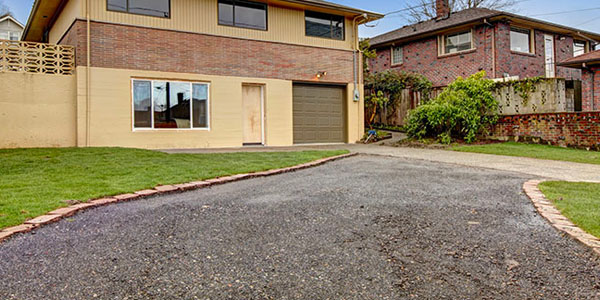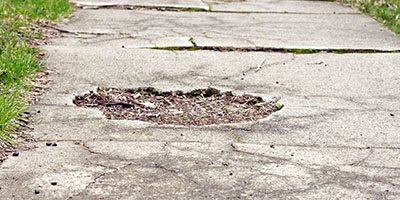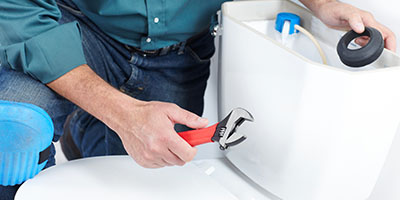When to Replace or Repair Your Driveway

When to Replace Your Driveway
You probably don’t spend a lot of time thinking about your driveway, until you notice a problem. If you’re seeing cracks, potholes and other wear and tear, you may be wondering where it came from and how to fix it.
Driveway damage can come from many sources, including motor oil or gas, de-icing materials, freezing temperatures and the weight of your vehicle. Keep reading to learn how to tell the difference between minor issues that require repairs and signs you may need a whole new driveway.
How Long Does a Driveway Last?
The lifespan of a driveway depends on factors such as climate and maintenance, but is primarily determined by material.
How long does a concrete driveway last?
If properly installed and cared for, a concrete driveway should last about 30 years. Concrete driveways in colder climate areas may break down sooner but should still last approximately 20 years.
How long does an asphalt driveway last?
An asphalt driveway will last between 15 and 20 years. You can extend the life of an asphalt driveway with regular maintenance.
6 Signs Your Driveway Needs Repairs
Wondering how to tell if you need driveway repairs? When you begin noticing changes in your driveway, you may need to make some plans for replacing, patching or resurfacing.
Look into repairs if your driveway has:
1. Small cracks that don’t connect
Cracks that are less than ¼ of an inch wide should be repaired before they spread. If water freezes and expands in a crack, the crack will become deeper and wider and is more likely to become an issue.
2. A pothole
One pothole can be easily fixed and, if addressed quickly enough, repairs can prevent future damage.
3. Sunken areas
If the driveway directly outside your garage is sinking lower than your garage floor, you can patch it and make it level again.
4. Faded color
If your driveway is a different color than it used to be, don’t worry. While this is a sign of age, it is still fine to use. If your driveway is concrete, you can fix the color by patching any cracks and adding a sealant.
5. Crumbling edges
Crumbling at the side of your asphalt driveway probably means the edges were too thin to begin with. Consider adding additional edging to prevent further damage.
6. Signs of wear but it’s less than 10 years old
Your driveway should last at least 15 years so if it’s less than 10 years old and is cracking or sagging, make repairs to extend its life.
Repairing your driveway is the right choice if the damage is minimal enough, covers less than 50% of the surface and if the repairs allow you to maintain the integrity of the driveway as a whole.
If the top of your driveway needs extensive repairs but the foundation is still intact, or if you are concerned about the look of patched concrete or filled in cracks, consider resurfacing it instead. Resurfacing includes replacing the top layer of concrete or asphalt instead of tearing it up completely or patching small portions. This will give your driveway a new look but will cost less than a complete replacement.
Resurfacing is more common with asphalt driveways but can be completed on a concrete driveway as well.
How much does it cost to resurface a driveway?
The cost to resurface, or repave, a driveway is somewhere between $1 and $3 a square foot. This is a more affordable option than replacing but will cost more more than patching or repairing individual cracks and potholes since the cost will apply to the full length and width of your driveway.
Driveway beyond repair? Learn how to remove it yourself!

5 Signs Your Driveway Needs Replaced
Replacing a driveway is a big decision and can be a big investment. You should look into a full driveway replacement if your driveway has:
1. Multiple potholes
A large number of potholes that are deep enough to affect the foundation are a good sign your driveway needs replaced. They will gather water and lead to more damage and will be costly to repair individually.
2. Alligator or spiderweb cracks
Cracks that are interconnected, look like scales and cover the majority of your driveway are a sign that it’s time to replace your driveway.
3. Aged more than 20 years
A concrete driveway that is 20 years old and showing signs of wear should be replaced completely.
4. Drainage issues
If your driveway or yard around it isn’t draining properly and is directing water toward your home’s foundation, you need to address this issue quickly to prevent other property damage.
5. Multiple areas that require independent repairs
If you have multiple issues that require repairs, that might be when it’s time to replace your driveway instead.
Ready to Replace Your Driveway? A Dumpster Can Help
How much does it cost to replace a driveway?
Replacing a driveway is an investment. When replacing a concrete driveway, expect to pay between $5 and $10 per square foot to have it installed. According to HomeAdvisor, the average cost to install a concrete driveway is $4,192. An asphalt driveway is less expensive at $3 to $4 per square foot but also has a shorter life and is less durable.
Should I replace my driveway before selling?
If you are planning to sell your home in the near future, replace your driveway instead of making repairs. While you may not get a dollar-for-dollar return-on-investment, a new driveway will add more appeal to your home than a patched or cracked driveway, which could quickly scare off potential buyers.



